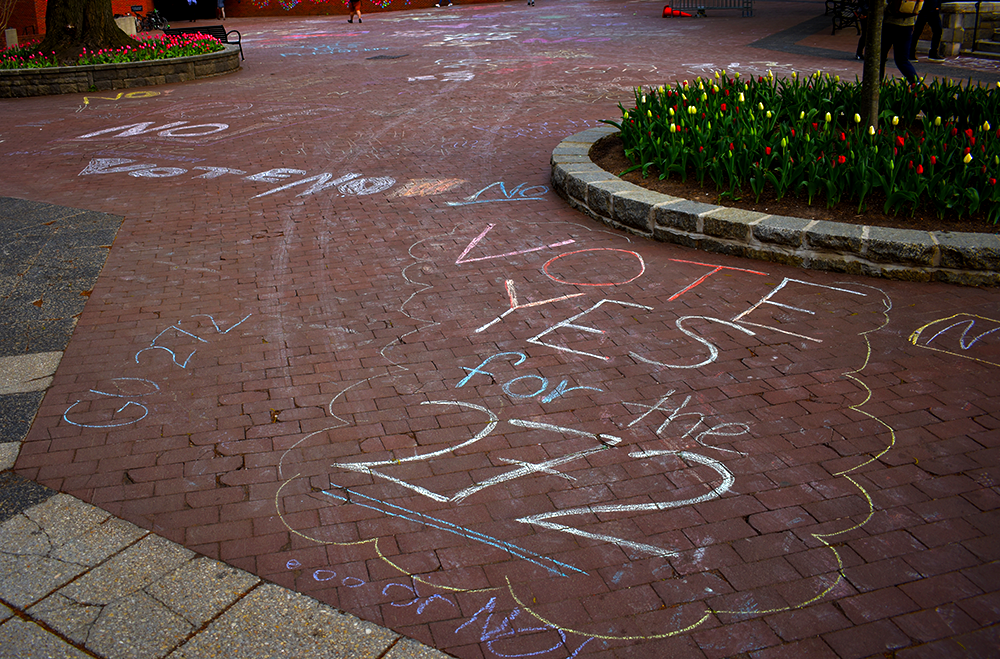The constitutionality of the GU272 referendum was confirmed by the Georgetown University Student Association constitutional council in a ruling Sunday in response to a suit brought by Rowan Saydlowski (COL ’21) and Chris Castaldi-Moller (SFS ’21).
With the referendum deemed constitutional, the GUSA senate voted unanimously at a Sunday meeting to confirm the results of the referendum, which originally passed with 66.1% of students voting to approve. As the suit alleged, the constitutional council found that the GUSA ethics and oversight committee and the GUSA election commission acted improperly at certain stages of the referendum, but determined that the referendum itself was not unconstitutional.
Following the council’s explanation of the ruling at the senate meeting, GUSA Constitutional Council Chief Justice William Morris (COL ’19) resigned from his position. Morris faced a challenge to the constitutionality of his extended tenure on the council ahead of the hearing and subsequent ruling, as his term was intended to end with the election of the new GUSA senate this spring. Morris responded to the challenge through an email detailing his qualifications for the position.
The GUSA senate was scheduled to confirm the results of the referendum the day the petition was submitted but was prohibited from voting on the matter until the council reached its verdict. Though the council held the hearing April 17, it occurred the day before the university’s Easter recess, leading to a large period between the hearing and the announced ruling.

In the initial suit, Saydlowski and Castaldi-Moller claimed GUSA did not have the power to issue referenda that address areas other than constitutional amendments and did not fully inform the student body about the referendum and the complaints process surrounding it.
As no explicit section of the GUSA constitution or bylaws exists that prohibits GUSA from introducing referenda on topics other than constitutional amendments, the association did not act outside of its authority, according to the council.
“The Constitution contains room for issue referendums to exist and the By-laws account for them,” the ruling reads. “It is clear that the Constitution’s discussion of referendums specifically involves constitutional amendment referendums. But crucially, an omission does not equal a prohibition. Searching throughout the Constitution, there is no prohibition on other types of referendums.”
Attached to GUSA senate elections April 11, the GU272 referendum voted to establish a semesterly fee that would go toward a fund benefiting the descendants of the GU272, the 272 enslaved people sold by the Maryland Province of the Society of Jesus in 1838 to financially sustain the university. The referendum currently awaits university action for the fee to be established.
Saydlowski and Castaldi-Moller filed the suit April 14 in an effort to nullify the results of the GU272 referendum by deeming it unconstitutional. They asserted the referendum was unconstitutional because of bylaw and constitutional violations by the election commission, and the ethics and oversight committee. The council heard arguments from both sides of the case at a hearing April 17.
The suit also claimed that ethics and oversight committee former Chair Dylan Hughes (COL ’19) acted upon a conflict of interest as they both co-sponsored the GU272 referendum as a GUSA senator and oversaw referendum complaint management as committee chair. However, the council found that Hughes did not violate the bylaws in serving on the committee as they did not specifically advocate for either side of the referendum in their co-sponsorship, but suggested that a member of the committee less involved with the issue be tasked with overseeing elections and referenda in similar future situations.
While the council designated the referendum as constitutional, the justices also ruled that the election commission, the body responsible for overseeing the referendum, failed to appropriately respond to complaints about the vote. The commission failed to investigate a complaint made by Alexander Mazzeo (SFS ’22) which argued that members of the “Vote Yes” campaign had participated in illegal door-knocking activities, according to the ruling.
The council recommends GUSA clarify its bylaws to more clearly outline the authority of the election commission and its responsibility in acknowledging complaints following Hughes’, according to the ruling.
“The Election Commission may benefit from establishing a certain set of requirements that a complaint is required to meet in order for it to constitute a credible complaint, and the Council further recommends that the Election Commission notify complainants of the actions taken in response to the complaints submitted by them,” the ruling reads.
GUSA executives Norman Francis Jr. (COL ’20) and Aleida Olvera (COL ’20) welcomed the ruling from the constitutional council and plan to work alongside the Senate to improve guidelines on filing complaints to the election commission and ethics and oversight Committee, according to GUSA Press Secretary Harper Thomas (SFS ’22).
“This administration believes that student referendums constitute a crucial cornerstone of the democratic process, and is glad that the Council has affirmed the expression of popular will represented by the overwhelming passage of the GU272 referendum,” Thomas wrote in an email to The Hoya. “We are committed to collaborating with the Senate to make changes where needed in order to best support and serve students.”
The failures of the ethics and oversight committee and election commission should be addressed, but they should not undermine the results of the referendum, according to the ruling.
“The voice of democracy is too loud to be overshadowed by the wrongdoings of a few individuals,” the ruling reads. “Nevertheless, the student body deserves elections and referendums free from misconduct, so all issues of the sort must be handled with diligence and care.”
This article was updated on April 28 to include the events of the Senate meeting and a comment from the GUSA executive.




















